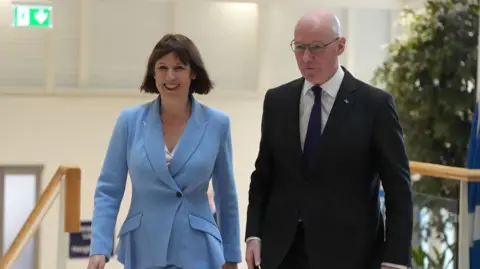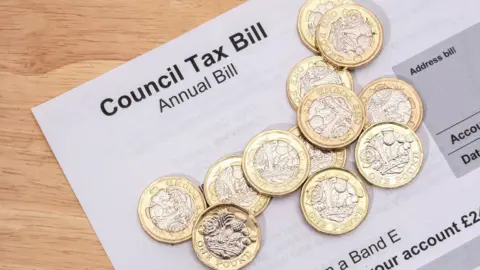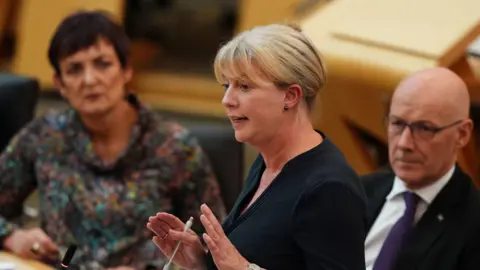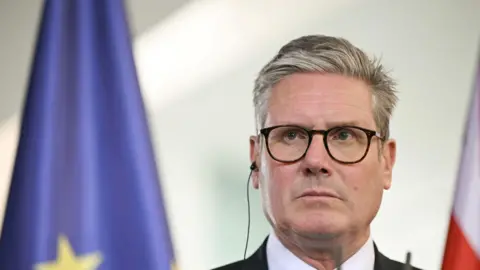 PA Average
PA AverageIt is usually the day the prime minister sets out their priorities for the coming parliamentary year – a political set-piece that provides an opportunity to set out the government’s vision (and a particularly important time for a leader who is new to the job, as which occurs in the case of John Swinney).
But the Program for Government has been delayed until tomorrow, giving way instead to a statement from Finance Secretary Shona Robison, where she detailed £500bn of cuts.
For the first minister, he and his cabinet are off to a great start as MPs return from their summer break.
 Getty Images
Getty ImagesAnd it sets the tone for the coming weeks and months – tough financial choices at both Westminster and Holyrood that will inevitably affect public services.
Cuts today are all about saving money this financial year.
A combination of factors The budget for 2024/25 is under pressure, with Ms Robison imposing spending controls across government departments, and looking for programs and projects that can be cut or delayed.
The Scottish government focuses on inflation, ongoing negotiations on public sector pay deals and uncertainty about its funding until a new Labor government is in Westminster. he presents his budget at the end of October.
The Fiscal Commission for Scotland – Scotland’s financial forecaster – says decisions taken by Scottish ministers played a role. These include his handling of previous pay arrangements, the calculation of council tax and social welfare payments.
 PA Average
PA AverageIt’s the wage markets that are really putting the pressure here.
Public sector wages cost around £25bn last year – more than half the total day-to-day budget.
Shona Robison admitted that the bill will rise by an extra £0.8bn this year. And remember, wage increases are a recurring cost that will affect future budgets as well.
Negotiations are still ongoing with council workers, teachers and NHS staff – so the final pay bill, and exactly how it will be paid, is not yet known.
That is a political choice for Scottish ministers. In the past, they have chosen to fund more generous wage offers than those made to workers south of the border. And this year, they say they have to find more money to keep up with inflation and try to avoid strikes.
Government supporters say the government has failed to plan for this – and now has to pay for it somehow.
Environmental anger
Ms Robison has found extra money from a variety of sources, including reinstating peak rail fares, cutting money from sustainable and active travel and nature restoration budgets, and raiding up to £460m from ScotWind revenues – money that had been put in certain initially for investment in the lawn. economy.
Given that ministers’ top priorities are tackling the climate emergency, the decisions will anger environmental campaigners.
Theirs was former partners in governmentThe Scottish Greens described the move as “a disaster for our climate”.
And it will be politically difficult for Mr Swinney to underline his commitment to net zero when he delivers his government program at Holyrood tomorrow.
Indeed, today’s announcement of significant spending cuts may dampen his plans for the year ahead.
 PA Average
PA AverageA longer-term debate is now underway about public spending options in general – the first minister has ruled out cutting universal benefits such as free prescriptions and concessional travel. But some are now questioning whether those – and increased spending on social security – can be delivered.
There is no money in the coffers for Mr Swinney’s bold investment promises – instead the focus is likely to be on growing the economy to generate money for public spending.
That’s a strategy Westminster is also using, warns Sir Keir Starmer “things will get worse before they get better“.
The UK Labor government is banking on economic growth to transform the country’s financial fortunes in the coming years.
Both governments agree on that – and were keen to establish better lines of communication than under Tory rule.
Relations between the Scottish and UK governments have certainly improved.
But financial pressure is reaching a political tipping point.
Scottish ministers have repeatedly pointed the finger at Labour, blaming UK ministers for failing to confirm whether extra funding will be available for pay markets, and calling for more austerity they have implemented after promising not to during the general election campaign.
Labor – along with the Conservatives – say this is a mess of the Scottish Government’s own making.
With budgets set to be decided at both Westminster and Holyrood on October 30 and December 4 respectively, expect the tussle over public spending – and the political choices that come with it – to continue in the coming months.
#statement #cuts #sets #tone #tough #financial #choices #ahead
